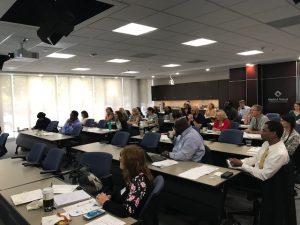
The North Carolina Medical Society (NCMS) Foundation’s Project OBOT hosted several Medication Assisted Treatment waiver sessions at the NCMS Center for Leadership in Medicine in Raleigh last week. The morning session focused on building team expertise in the office based opioid treatment model. The evening session was geared toward providers and the clinical support system in using buprenorphine in the office based treatment of opioid disorders. Both sessions were well-attended and more are being planned now. Watch your NCMS Bulletin and the Project OBOT website for details.
Opioid addiction is a chronic, relapsing brain disease that affects millions of Americans and produces a tremendous burden on the health care system. In 2002, U.S. physicians gained the opportunity to treat opioid-addicted patients with buprenorphine in primary care settings, commonly referred to as office-based opioid treatment (OBOT). OBOT has been shown to be effective in primary care settings and impacts public health through the reduction of opioid use, opioid overdose mortality, and transmission of infectious diseases. However, it remains underutilized.
One consistently cited barrier preventing OBOT expansion is lack of adequate clinical support given the additional needs for patient monitoring. Successful medication-assisted treatment (MAT) requires a team-based approach just like treatment for other chronic diseases. The NCMS Foundation’s Project OBOT brought together a coalition of health care organizations and community resources to support physicians, PAs and their patients as they undergo Medication Assisted Treatment.
Listen to the NCMS’ Bedside Manners podcast in which Project OBOT founder the NCMS Foundation’s Franklin Walker talks about ‘Helping Physicians and Patients Tackle Opioid Use Disorder.’
